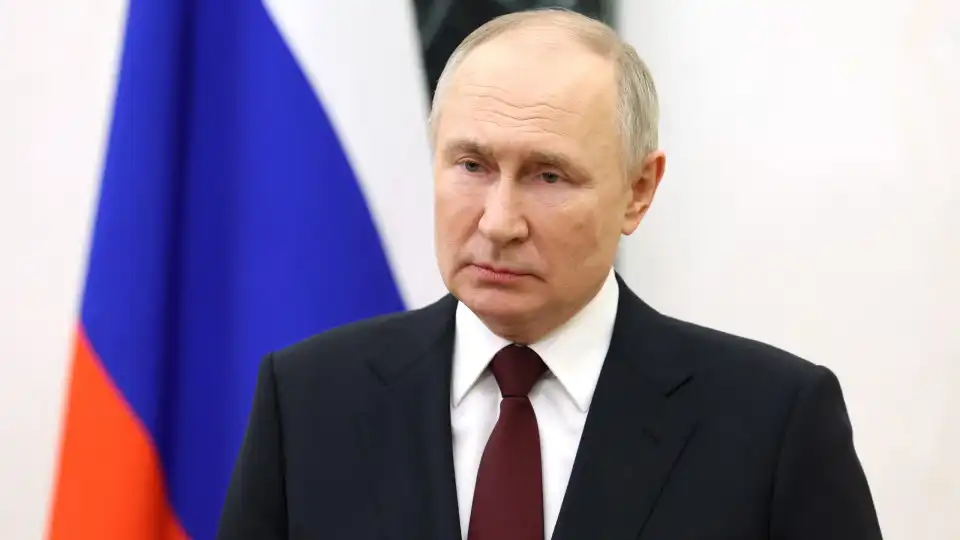Putin in Beijing to ‘prevent disruptions’ in Chinese economic support
Russian leader Vladimir Putin’s trip to Beijing is aimed at preventing disruptions in China’s economic support for Moscow, analyst Alexandra Prokopenko noted in an analytical article published by the British newspaper Financial Times.

© ALEXANDER KAZAKOV/POOL/AFP via Getty Images

Mundo rússia/china
“One of [Putin’s] key goals is to find ways to minimize any disruption to the economic support that China has been providing to his regime, which has been struggling since the start of the full-scale invasion of Ukraine,” wrote Alexandra Prokopenko, a research fellow at the Berlin-based think tank Carnegie Russia and Eurasia.
Trade between China and Russia grew by 26.3% year on year to $240bn (€223bn) in 2023.
Beijing has become the single largest market for Russian oil and gas and a major source of imports, including dual-use civilian and military goods that keep the Russian war machine running, despite China banning arms sales to its neighbor.
In recent months, US Treasury Secretary Janet Yellen and Secretary of State Antony Blinken have visited China and warned Chinese officials and financial institutions against facilitating payments for the Russian war effort.
Chinese exports to Russia fell by 15.7% in March and 13.5% in April year on year, suggesting that the warnings have had some effect.
“The hope that this will solve the problem once and for all is illusory,” Prokopenko argued in an analysis piece for the Financial Times.
“Over the past two years, the Chinese and Russian governments have demonstrated a remarkable ability to adapt to US-imposed restrictions. Putin’s visit provides a fresh opportunity to discuss options in private before rolling them out quietly,” she added.
The researcher expects Putin, who is due to start a two-day visit to China on Thursday, to be accompanied by a team from the central bank and the finance ministry responsible for the Kremlin’s drive to reduce the Russian economy’s reliance on the US dollar.
“These bold measures allowed the country to withstand the initial shock of sanctions and then swiftly shift its financial system away from dependence on the dollar and the euro towards the [Chinese currency] renminbi,” Prokopenko wrote.
As of December 2023, the Chinese currency accounted for more than a third of settlements in Russia’s trade with foreign partners — up from virtually zero before the war. Deposits in renminbi in Russia reached $68.7bn in 2023, overtaking holdings in dollars.
This was made possible by Russia creating a domestic analogue of the international financial messaging system Swift shortly after the 2014 sanctions.
China also operates its own cross-border interbank payment system, the Cips, which now includes about 30 Russian banks.
Cips is not only used to process payments between China and Russia. In April 2023, for example, Bangladesh used it to pay the Russian state atomic energy corporation for work on a nuclear power plant in renminbi.
“While Cips cannot rival Swift in terms of volume, the war in Ukraine is fueling its expansion. Daily transactions reportedly increased by 50% in 2022 and by another 25% in the first three quarters of 2023,” according to Belousov.
The researcher predicted that Moscow and Beijing would aim to create a sophisticated infrastructure to clear more sensitive payments.
“A clearing scheme for problematic payments could involve smaller banks that only transact in their national currencies and use only local infrastructure. Multiple shell companies are likely to be involved as intermediaries, including from Central Asia and the Gulf,” she wrote.
Such transactions would be “more costly and time-consuming” but would be “much harder” for the US to detect, she noted.
“Chinese authorities could thus perfect a financial infrastructure that could be used by other nations seeking an antidote to Washington’s weaponization of the dollar,” she wrote.
Read Also: Putin visits China this month. It is the 1st visit abroad after re-election (Portuguese version)


Descarregue a nossa App gratuita.
Oitavo ano consecutivo Escolha do Consumidor para Imprensa Online e eleito o produto do ano 2024.
* Estudo da e Netsonda, nov. e dez. 2023 produtodoano- pt.com



